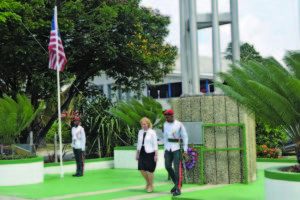
As the time counts down to the constitutionally mandated General and Regional Elections in Guyana, the United States (US) has re-reiterated the need for free and fair polls.
This call was made by the newly accredited US Ambassador to Guyana, Sarah-Ann Lynch.
In brief remarks after handing over her credentials to President David Granger on Wednesday morning at the Ministry of the Presidency, Ambassador Lynch lauded Guyana for the significant progress made particularly in the political sphere.
Without making mention of the current political impasse, the newly accredited US envoy did, however, point to the need for free and fair elections.
“We have seen the strengthening of democratic processes and political institutions along with broader political participation and citizens’ representation. Moving forward, we will continue to encourage genuinely free and fair elections, freedom of speech and assembly, multiparty representation and a constitutional judiciary process…,” the new US Ambassador said.
On the other hand, President Granger, in his remarks, reminded that among the areas Guyana and the US enjoy strong bi-lateral relations is non-interference in each other’s internal affairs.
“Our relations are founded on mutual respect for each other’s territorial integrity and sovereignty, mutual non-interference in each other’s internal affairs, cooperation for mutual benefit, respect for treaties and international law and the maintenance of regional peace and security,” the Head of State posited.
Since the December 21, 2018 passage of the motion of no-confidence against the A Partnership for National Unity/Alliance For Change coalition, calls have been made by various stakeholders including foreign diplomats for the Government to abide and respect the Constitution and set a date for elections.
The foreign missions have been paying keen attention to the developments in Guyana since the Opposition People’s Progressive Party (PPP) filed the No-confidence Motion against the Government.
Only on Monday, British High Commissioner Greg Quinn in an exclusive interview with Guyana Times International said the clock is ticking on the constitutional three-month deadline for holding elections. This deadline expires in eight days.
“The Constitution is the supreme law… There is the three-month clock, which is still ticking, it hasn’t been stayed yet…,” the United Kingdom envoy told this newspaper on Monday.
Moreover, representatives from the United Nations (UN) and the European Union (EU) have also echoed similar calls for the Guyana Government to adhere to the constitution.
In February, the EU’s local mission warned of the need for constitutional compliance, urging in a statement that democratic procedures and the rule of law be respected and upheld. The EU also called for free and fair elections to be held and for the Guyana Government to follow all requirements outlined in the Constitution of Guyana following the December 21, 2018 no-confidence vote.
Days before, however, United Nations Resident Coordinator Mikiko Tanaka urged the State to demonstrate its integrity and respect Guyana’s Constitution.
“Recent political developments triggered by the no-confidence vote in the National Assembly are a test for Guyana’s strength and integrity with regard to the effectiveness of the rule of law and governance,” Tanaka said.
She further lauded acting Chief Justice Roxane George for demonstrating the independence and integrity of the Judiciary when it comes to protecting the Constitution of Guyana.
The acting Chief Justice had ruled on January 31, 2019, that the No-confidence Motion was validly passed 33-32 in the National Assembly and the Cabinet has to resign in keeping with constitutional provisions of Article 106 (6) and 106 (7) respectively.
Consequent to the declaration that the 33-majority meant that the motion was carried, Justice George observed that the President and the Ministers could not, therefore, remain in Government in accordance with Article 106 (6) and 106 (7) of the Constitution after three months.
However, the Granger-led Administration has insisted that there is no role for a “caretaker” Government and that they will continue to be in office until a new President is sworn in. In fact, the coalition has appealed the High Court’s rulings and those matters are currently being heard in the Court of Appeal.



